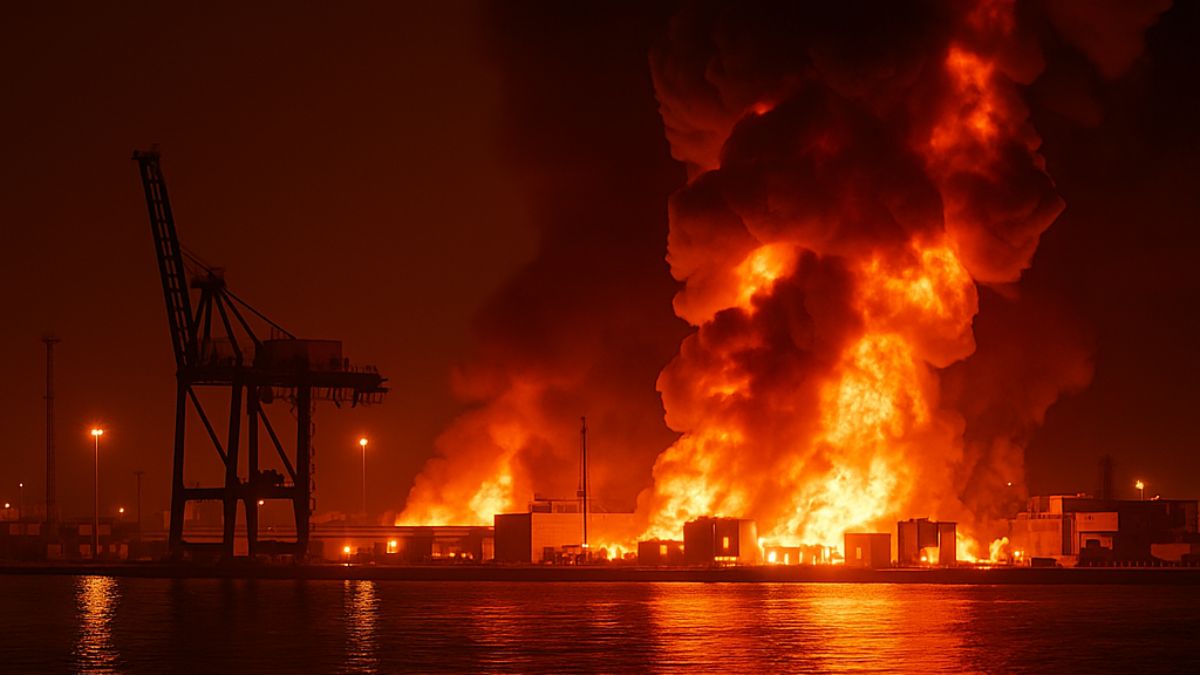Israeli Navy Strikes Yemen’s Houthi Targets: Why Is Hodeidah Port A Flashpoint?

Israeli Navy carried out strikes on Hodeida Port in Yemen. Image courtesy: AI-generated picture via DALL-E
Israel carried out a rare naval strike on Yemen’s Red Sea port of Hodeidah on Tuesday, escalating its confrontation with the Iran-backed Houthi movement, which has launched repeated missile and drone attacks toward Israel since the start of the Gaza war in October 2023.
The Israeli military said the navy struck weapons transfer sites used by the Houthis in Hodeidah, marking a long-range operation that was prepared in advance and executed from hundreds of kilometers away. While the Houthi-run Al Masirah TV confirmed two strikes on port docks, there were no immediate reports of casualties.
Why did Israeli Navy attack Hodeidah Port?
Israel’s Defence Minister Israel Katz said the operation was in response to continued missile and drone attacks by the Houthis targeting Israeli cities and shipping routes in the Red Sea. “We warned the Houthi terror organisation that if they continue to fire toward Israel, they will face a powerful response and will be subjected to a naval and aerial blockade,” Katz said in a statement on X.
The Israeli military earlier urged evacuation of Houthi-controlled ports, including Ras Isa, Salif, and Hodeidah. Officials noted that naval assets were specifically chosen for the operation based on operational and strategic considerations.
The British maritime security firm Ambrey confirmed that merchant vessels in Hodeidah were not damaged but advised ships operating in the area to minimize crew movement on deck due to the elevated threat environment.
How did the Houthis respond to Israel’s naval strike?
Soon after the Israeli operation, Houthi military spokesperson Yahya Sarea claimed the group had fired two ballistic missiles at central Israel, targeting the city of Jaffa. While Israel reported that a missile launched from Yemen was likely intercepted, air-raid sirens were triggered in several regions.
In a televised speech, Sarea also warned international companies against continuing to use Israel’s port of Haifa, which he declared a legitimate military target following the Israeli strike on Hodeidah. “In response to the aggression on Hodeidah, the Yemeni Armed Forces warn all companies and various entities against continuing to deal with the port of Haifa, which has become a target,” he said.
What is the broader context of Israel-Houthi hostilities?
Since the outbreak of the Israel-Gaza war in October 2023, the Houthis have launched dozens of drone and missile attacks toward Israel and against commercial vessels in the Red Sea, in what they describe as solidarity with Palestinians in Gaza. Most of the projectiles have been intercepted or failed to reach Israeli territory.
In response, Israel has carried out a series of air and now naval strikes on Houthi positions. The United States also launched strikes on Houthi targets earlier this year, but these were halted by President Donald Trump after the Houthis pledged to stop targeting American vessels.
Despite being under pressure from Israeli, Saudi, and Western forces over the years, the Houthis remain a resilient paramilitary force with an arsenal that includes ballistic missiles and armed drones. Their leader, Abdul Malik al-Houthi, has transformed the group from a modest insurgency into a highly organized military actor, now capable of challenging regional powers and disrupting global trade routes.







